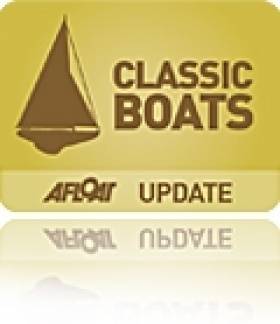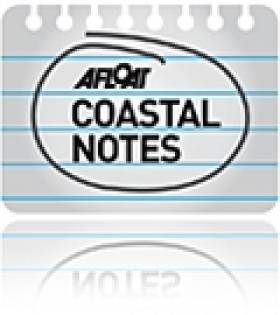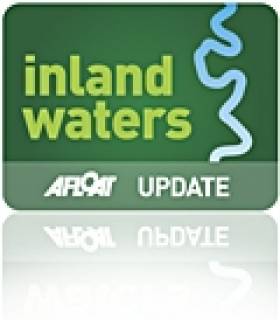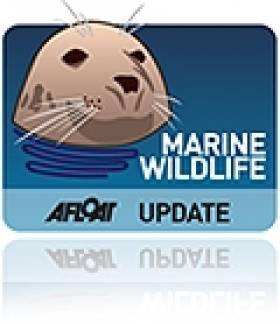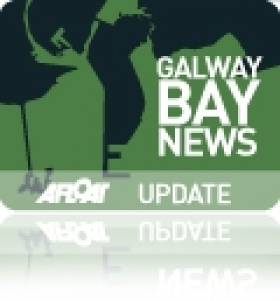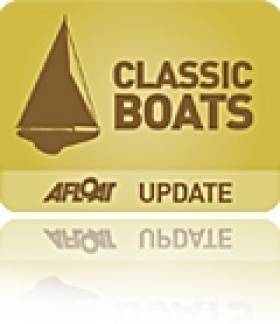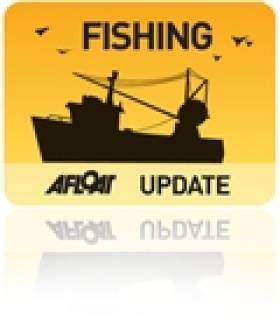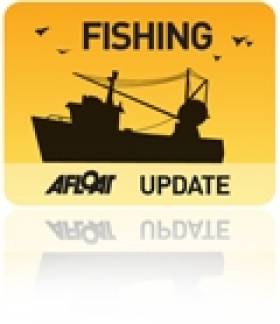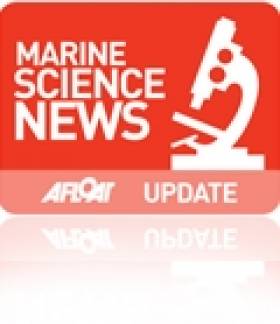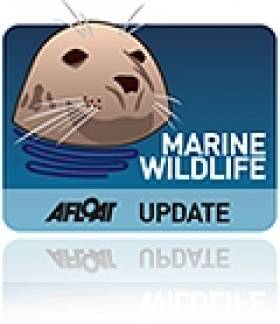Displaying items by tag: Galway
Canadians Lobby To Keep 'Grandfather Canoe' Amid Ownership Fears
#HistoricBoats - A Canadian community descended from the builders of the world's oldest birchbark canoe have expressed concern that the vessel may be returned to Ireland, according to The Irish Times.
As previously reported on Afloat.ie, the 'Grandfather Canoe', or Akwiten, was crafted by the Mailseet First Nation in Canada's Maritimes for use on the St John River valley in New Brunswick under British colonial rule almost 200 years ago.
A programme for RTÉ Radio's Documentary on One strand in August explained how the canoe later passed into the ownership of British army captain Stepney St George, who took it home to Headford Castle, from where it was later bequeathed to NUI Galway.
In the 2000s the canoe was rediscovered and after a First Nations campaign, in 2009 it was repatriated and presented to the Beaverbrook art gallery in New Brunswick, where it is presently in storage without exhibition space.
It has lately emerged that the historic vessel's current ownership status is unclear, prompting fears that it may be sent back to the City of the Tribes.
Members of the Mailseet community are now lobbying for the right to care for and exhibit what is a "spiritual and cultural artefact" to their people.
The Irish Times has more on the story HERE.
Dead Jellyfish On Galway Beach Still Pack A Sting, Experts Warn
#Jellyfish - Summer may be long gone, but jellyfish attracted by the warmer waters of recent months are still posing a hazard on Galway's beaches, as the Connacht Tribune reports.
Recent weeks have seen Salthill strewn with the remains of hundreds of dead mauve stingers, which can still pack a punch even after death.
Meanwhile, though marine science boffins are not surprised by the sheer numbers of the seaborne creatures in Galway Bay as this period is their mating season, they are concerned that so many are being washed ashore.
The jellyfish warning comes not long after Fáilte Ireland's falling afoul of locals for advising against bathing at Salthill's popular strand.
While recommending the city suburb's famous promenade for walking and sightseeing, the tourism board's Discover Ireland website reportedly stated that "swimming is not recommended" at the adjacent beachs.
No reasons were given for this advice, which has raised the ire of locals including Labour Party city councillor Niall McNelis, who said: “I cannot understand why Fáilte Ireland would warn people not to swim in Salthill. It has a Blue Flag."
Galway City Waterways In 'Dire State' Says Councillor
#InlandWaters - The "neglect" of Galway city's "deteriorating" waterways was on the agenda at last night's city council meeting.
Sinn Féin's Cllr Anna Marley sought to raise the issue of poor maintenance of waterways such as the Gaol River beside Galway Cathedral, plagued by a build-up of silt and weeds as a result of "man-made blockages such as sluice gates", let alone the "disturbing sight" of bottles and cans dumped in the water there and elsewhere.
And as the Galway Advertiser reports, Cllr Marley hopes to work with the council and Inland Fisheries Ireland to develop a strategy for the "radical and positive" overhaul of Galway's rivers and canals.
Galway Bay Swimmers Rescued From Dolphin Attack In Salthill
#MarineWildlife - Galway RNLI's lifeboat came to the rescue of five swimmers who were attacked by a dolphin off Blackrock Tower at Salthill yesterday evening (Wednesday 1 October).
Reports from people who witnessed the incident say the large marine mammal was circling the swimmers then swimming at them in an intimidating way and glancing off them, coming and going, with its tail and nose.
After a member of the public raised the alarm with the Irish Coast Guard, the lifeboat launched from the nearby docks around 7.25pm and was on scene within five minutes.
A fishing vessel in the area had moved in separate the dolphin from the swimmers, and the lifeboat joined in to keep the cetacean at bay until they made it safely ashore.
The swimmers were said to be very shaken by the incident but did not require medical assistance.
Lifeboat helm Ciaran Oliver said his crew then did a sweep of the beach from Blackrock to Seapoint to warn others, assisted by additional lifeboat crew on the promenade.
It's not yet clear what dolphin was responsible for this incident, though it comes just days after reports that an aggressive migrating dolphin known as Clet had taken up with the bottlenose once known as Dusty off the nearby Aran Islands in Galway Bay.
Take A Video Tour Of Galway From City To Coast
#Galway - Care of the Daily Edge, here's a special treat for any fans or residents of the City of the Tribes.
Búlabosca Film's short video 'This is Galway' showcases the varied sights and experiences from city to coast and beyond.
Stunning seaside vistas, world-class angling and watersports, delicious fresh seafood – they're all celebrated here, and with good reason.
#HistoricBoats - The discovery of a traditional anadian river canoe in the rafters of a Galway building sparked an investigation by radio documentary maker Joe Kearney that goes back some 200 years to Ireland's deep connections with the New World.
The 'Grandfather Canoe' – or Akwiten, to give its native name – was originally crafted by the Mailseet First Nation of New Brunswick in Canada's Maritimes, a people who have made and paddled canoes along the St John River for thousands of years.
In his programme for RTÉ's Documentary on One strand, Kearney charts the history of Akwiten from its days on the St John to its removal to Headford Castle in Co Galway by British army captain Stepney St George, its bequeathal to NUI Galway amid the turmoil of post-famine Ireland, and its and eventual – and surprising – rediscovery.
#FishFarm - Undercurrent News reports that Friends of the Irish Environment (FIE) is seeking a High Court injunction against Marine Harvest Ireland over an unauthorised pipeline used to extract water from a freshwater lough to treat salmon at its farm on the Galway coast.
As previously reported on Afloat.ie, the operators of the salmon farm at Kilkiernan Bay installed a pipeline more than 3km long connected to nearby Loughaunore in order to treat an outbreak of amoebic gill disease.
But Galway County Council had not yet made any decision on permitting the pipeline, which was proposed for exemption from standard planning requirements.
The council has since ruled that the development was unauthorised and did require planning permission.
Yet the pipeline remains in place - prompting FIE to seek an injunction against the Irish branch of the Norwegian seafood giant under Section 160 of the Planning and Development Act. More on the story HERE.
Meanwhile, Marine Harvest has been identified as the "most likely" foreign investor to be attracted by the controversial fish farm proposals for Galway Bay and elsewhere, as Victoria White writes in the Irish Examiner.
The columnist visited Inishbofin in Co Galway and Inishturk in Co Mayo, close to the latest proposed location for massive farmed salmon operations, to get the local perspective, and found some vociferous arguments against the shape of BIM's plans - particularly the damaging effects of large-scale monoculture as opposed to smaller but widespread sustainable schemes.
Fish Farm Taps Lake For Disease Treatment Without Permission
#FishFarm - No council permission was given for a pipeline laid last month to extract water from Loughaunore to a nearby salmon farm in Kilkieran Bay in Co Galway, as the Connemara Journal reports.
Marine Harvest Ireland installed the 3.25km pipeline to help treat an outbreak of amoebic gill disease among its farmed salmon, but did so before a decision was made by Galway County Council over an exemption for the project from the usual planning permission requirements.
It's also claimed by Irish Water that despite a claim in Marine Harvest Ireland's Section 5 application that it has an 'agreement' with the new water metering body, no such agreement exists.
While extraction of potentially millions of litres of water from the lake has paused for now, local campaigners argue that the situation is typical of problems connected with fish farming - the subject of much controversy in the county since the furore over the planned large-scale organic salmon farm for the Aran Islands.
The Connemara Journal has much more on the story HERE.
#Marine - Local primary school teachers in Galway have just finished a week-long training course (1-5 July) on how to incorporate marine studies into their schools through fun activities and projects.
Sea for Society (EU FP7 project) research last year across a number of EU countries found that ‘ignorance’ and ‘lack of understanding’ are key barriers to the development of a sustainable marine ecosystem.
The Marine Institute and Galway Atlantaquaria tackled this barrier by introducing teachers to their local seashore, using it as a unique teaching resource.
“Through the Explorers Education Programme and teachers' training course, we provide an opportunity for teachers to learn about their local seashore as well develop an understanding about the importance of Ireland’s marine resource and ocean wealth,” said the Marine Institute's Cushla Dromgool-Regan.
Offering a wide range of cross-curricular activities involving science, mathematics, English, geography, history and art, the programme is intended to help teachers feel more confident and enabled to innovate and inspire students in learning about the marine.
”The Explorers' annual teacher’s training course has been run through the Galway Education centre for nearly eight years and continues to be popular with teachers, booking up early each year," Dromgool-Regan added.
One of the teachers on the most recent course, Bróna Smyth of Scoil Mhuire in Maree, said it was "invaluable in offering practical concepts that can be used on the seashore and in class by interlinking the subjects.
"The hands-on approach, learning about species and seaweeds, making seashore keys, collecting marine litter data for graphs, completing water experiments to creating seashore poetry and stories are all key to embedding the understanding of how important the ocean is and how it impacts our daily lives.”
Primary school teaching materials relating to the seashore and marine are available through the Explorers Education Programme at www.explorers.ie.
Galway Gardaí Come To The Rescue of Stranded Baby Seal
#MarineWildlife - Gardaí in Galway were on hand to rescue a stranded baby seal at Weightman's Pier in the city on Friday 4 July.
As TheJournal.ie reports, gardaí said the young seal, estimated to be four weeks old, was found "in poor condition and would not have made it through the night" if not for treatment by a local vet.
Here's hoping the little one makes a full recovery.
Elsewhere in Ireland, tourists at Malin Head have been treated to some spectacular displays by as many as 50 dolphins in an area already renowned for regular killer whale and basking shark sightings.
Indeed, Independent.ie reporting that local boat charters are being inundated with requests for dolphin-spotting trips.



























